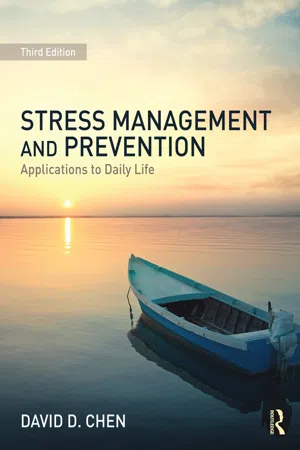
- 422 pages
- English
- ePUB (mobile friendly)
- Available on iOS & Android
About this book
Gain a critical understanding of the nature of stress from a positive psychology framework that allows you to look beyond a simple pathology of stress-related symptoms. This new edition of Stress Management and Prevention integrates Eastern and Western concepts of stress while emphasizing an experiential approach to learning through the use of exercises, activities, and self-reflection. This student-friendly text contains chapters on conflict resolution, mindfulness meditation, time management, prevention of health risks, and cognitive restructuring. Included throughout are an emphasis on mindfulness and the neuroscience behind it, more theories, and new techniques for stress reduction and time management. An updated companion website includes even more video-based activities so students can see techniques in practice.
Frequently asked questions
- Essential is ideal for learners and professionals who enjoy exploring a wide range of subjects. Access the Essential Library with 800,000+ trusted titles and best-sellers across business, personal growth, and the humanities. Includes unlimited reading time and Standard Read Aloud voice.
- Complete: Perfect for advanced learners and researchers needing full, unrestricted access. Unlock 1.4M+ books across hundreds of subjects, including academic and specialized titles. The Complete Plan also includes advanced features like Premium Read Aloud and Research Assistant.
Please note we cannot support devices running on iOS 13 and Android 7 or earlier. Learn more about using the app.
Information
I Understanding the Nature of Stress
- 1 The Meaning of Stress
- 2 The Body’s Reactions to Stress
- 3 Sources of Stress across the Lifespan
- 4 Adaptive and Maladaptive Behavior
- 5 Individual and Cultural Differences
The Meaning of Stress

- What are the different ways that stress can be defined and conceptualized?
- What are the different ways that people respond to adversity in their lives?
- How can you assess the signs and symptoms of stress as they occur in yourself and others?
- Stress is ordinarily thought of as a fairly negative state, something to be avoided whenever possible. But how can stress be highly functional and operate as a survival mechanism?
- What is the general adaptation syndrome (GAS) and how does it function during times of stress?
- What is the primary goal of stress management? Can such a program completely eliminate stress?
- What are major sources of stress and how are they recognized?
- How do you interpret the following statement: “Stress is not what exists on the outside, but how you perceive a situation on the inside”?
- How does the dynamical systems theory interpret stress and stress coping? What are the six key concepts of the dynamical systems theory?
What Is Stress Anyway?
Meanings of Stress
Table of contents
- Cover Page
- Half Title Page
- Title Page
- Copyright Page
- Brief Contents
- Contents
- A Personal Introduction: From the Author to the Students
- About the Author
- Part I Understanding the Nature of Stress
- Part II Strategies of Stress Management and Prevention
- Part III Strategies of Synthesis and Prevention
- Glossary
- Index